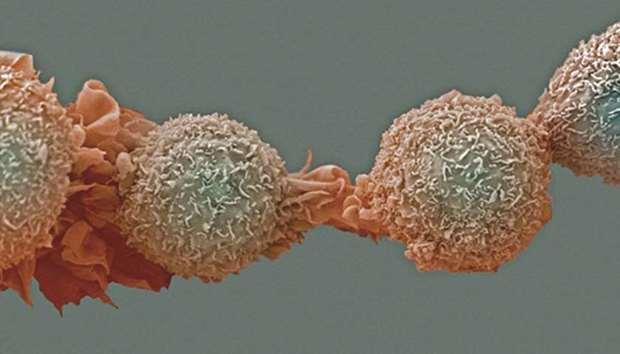
403
Sorry!!
Error! We're sorry, but the page you were looking for doesn't exist.
Qatar- New genetic syndrome causing cancer identified
(MENAFN- Gulf Times) Researchers have identified a new genetic syndrome caused by alterations in a gene that predisposes the body to early formations of tumours and chemotherapy toxicity.
The findings, led by Jordi Surralles, Professor at the University at Autonoma de Barcelona, showed that the genetic syndrome is caused by mutations in both copies of the FANCM gene also known as biallelic mutations.
In the study, published in the journal Genetics in Medicine, the team analysed biallelic mutations in the FANCM gene.
They observed that there was an early onset of cancer and toxicity to chemotherapy, but the patients did not present any congenital malformations or haematological phenotype which could suggest being affected by Fanconi anaemia, a rare disease which affects one out of every 100,000 children.
Until now, it was believed that the FANCM gene was related to this disease, because in 2005 the biallelic mutation was observed in patients suffering from Fanconi anaemia.
The patients, however, had suffered from cancer at very early ages and also presented chemotherapy toxicity.
Researchers led by Javier Benitez at the Spanish National Cancer Research Centre (CNIO) confirmed that women with biallelic mutations in the FANCM gene did not develop Fanconi anaemia, but presented a higher risk of breast cancer, chemotherapy toxicity and chromosomal fragility.
'Therefore, in view of the new syndrome, there is a need to modify the clinical monitoring of patients with biallelic mutations in the FANCM gene and taking precautions when using chemotherapy and radiation therapies due to the acute toxicity they may produce, the researchers suggested. - IANS
The findings, led by Jordi Surralles, Professor at the University at Autonoma de Barcelona, showed that the genetic syndrome is caused by mutations in both copies of the FANCM gene also known as biallelic mutations.
In the study, published in the journal Genetics in Medicine, the team analysed biallelic mutations in the FANCM gene.
They observed that there was an early onset of cancer and toxicity to chemotherapy, but the patients did not present any congenital malformations or haematological phenotype which could suggest being affected by Fanconi anaemia, a rare disease which affects one out of every 100,000 children.
Until now, it was believed that the FANCM gene was related to this disease, because in 2005 the biallelic mutation was observed in patients suffering from Fanconi anaemia.
The patients, however, had suffered from cancer at very early ages and also presented chemotherapy toxicity.
Researchers led by Javier Benitez at the Spanish National Cancer Research Centre (CNIO) confirmed that women with biallelic mutations in the FANCM gene did not develop Fanconi anaemia, but presented a higher risk of breast cancer, chemotherapy toxicity and chromosomal fragility.
'Therefore, in view of the new syndrome, there is a need to modify the clinical monitoring of patients with biallelic mutations in the FANCM gene and taking precautions when using chemotherapy and radiation therapies due to the acute toxicity they may produce, the researchers suggested. - IANS

Legal Disclaimer:
MENAFN provides the
information “as is” without warranty of any kind. We do not accept
any responsibility or liability for the accuracy, content, images,
videos, licenses, completeness, legality, or reliability of the information
contained in this article. If you have any complaints or copyright
issues related to this article, kindly contact the provider above.

















Comments
No comment